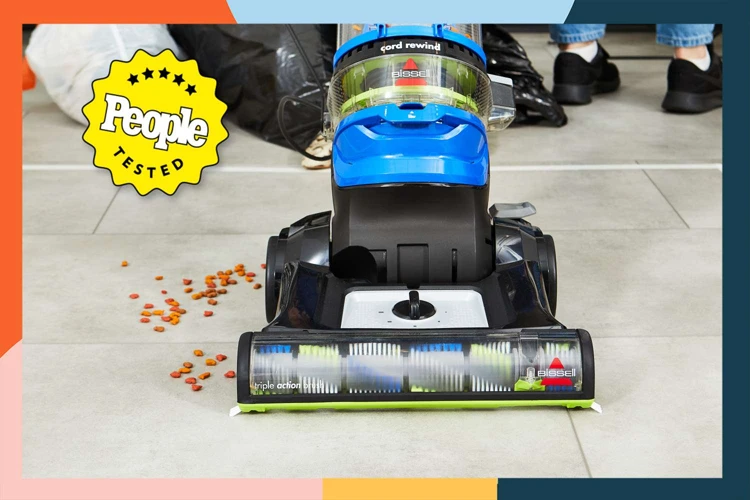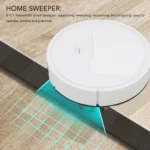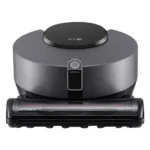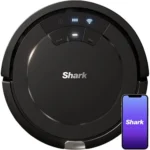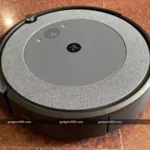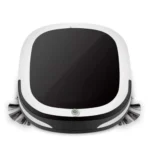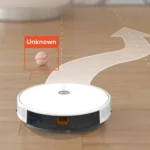Are you tired of seeing your energy bills skyrocket every time you vacuum your home? It’s a common problem that many homeowners face, and it’s all thanks to the high energy consumption of traditional vacuum cleaners. But have you ever wondered how much energy your vacuum cleaner actually uses or what the hidden costs of using one are? In this article, we’ll take a detailed look at the issue of high energy consumption in traditional vacuum cleaners and explore the benefits of using smart vacuum cleaners. We’ll also show you how these innovative devices can help you save money and energy while keeping your home clean. So let’s dive in and discover a smarter way to clean your home!
The Energy Consumption Problem of Traditional Vacuum Cleaners
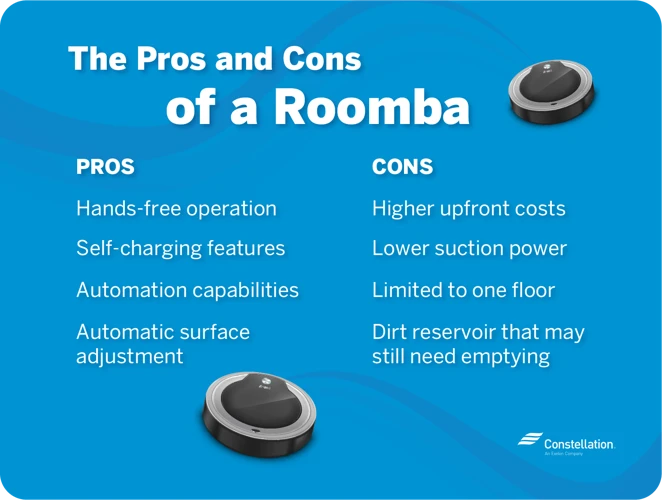
Traditional vacuum cleaners have been an integral part of our cleaning routines for decades. They are efficient in removing dust and dirt from carpets, floors, and other surfaces. However, over the years, the energy consumption of traditional vacuum cleaners has become a critical issue. The amount of energy they consume can no longer be ignored. This is why it is crucial to understand the problem of the energy consumption of traditional vacuum cleaners to find ways to address it. In this section, we will explore the energy consumption issue of traditional vacuum cleaners, its hidden costs, and its impact on our environment. We will also explain why it is necessary to switch to smart vacuum cleaners for a more sustainable and cost-effective cleaning solution.
Understanding the Issue of High Energy Consumption
The energy consumption problem of traditional vacuum cleaners is a serious issue that needs to be addressed. Most traditional vacuum cleaners consume a lot of energy, which leads to high electricity bills. These vacuum cleaners are not only costly to operate but also have several disadvantages.
Here are some of the reasons behind the high energy consumption of traditional vacuum cleaners:
- The high wattage of the motor: Traditional vacuum cleaners have motors that range from 1200 to 3000 watts. These motors require a lot of energy to run, leading to high energy consumption.
- Poor design: Most traditional vacuum cleaners are designed with poor energy efficiency. They have leaks and poor seals, which makes them suck more air, and the motor has to work harder to maintain suction, leading to higher energy use.
- Age of the vacuum cleaner: The older a vacuum cleaner is, the more energy it consumes. With time, the motor becomes less efficient and starts using more power.
- The size and weight of the vacuum: Larger and heavier vacuum cleaners take more energy to move around, leading to higher energy consumption.
The consequences of high energy consumption of traditional vacuum cleaners are not negligible. Apart from the high energy bills, using traditional vacuum cleaners has several hidden costs. For instance, the loud noise they produce can harm your hearing, which may require expensive hearing aids later in life. Additionally, traditional vacuum cleaners come with multiple health hazards. The dust and allergens accumulated by vacuum cleaners can cause asthma, allergies, and other respiratory problems. Traditional vacuum cleaners often struggle to clean tight spaces, carpets, and rugs effectively, leading to inefficient cleaning, which can cause long-lasting damage to the carpets and rugs. It also means that you may have to replace them more often, which is a significant financial burden. Lastly, cleaning with traditional vacuum cleaners can be a hassle, especially in large homes, where you may need to stop and change outlets frequently to reach every corner.
Understanding the issue of high energy consumption of traditional vacuum cleaners is crucial. It is essential to consider these hidden costs when purchasing a vacuum cleaner. Stay tuned to learn about the benefits of using smart vacuum cleaners that not only reduce energy consumption but also eliminate the disadvantages of traditional vacuum cleaners.
The Hidden Costs of Traditional Vacuum Cleaners
Many people don’t think about the hidden costs of traditional vacuum cleaners, but they can add up quickly. Using traditional vacuum cleaners could lead to health hazards, spending more money on electricity bills, and even indirectly harming the environment.
One of the biggest hidden costs of traditional vacuum cleaners is inefficient cleaning of carpets and rugs. Traditional vacuum cleaners are not able to remove dirt, dust, and pet hair from carpets and rugs completely. This not only means that you have to vacuum more often, but it also means that you may have to replace your carpets and rugs more frequently. This can add up to a lot of money over time.
Another hidden cost of using traditional vacuum cleaners is the amount of energy they consume. Traditional vacuum cleaners consume a lot of energy when they are plugged in and turned on. This is because they use motors that require a lot of power to run. If you vacuum your home every day, the energy consumption adds up quickly. This will lead to higher electricity bills and, indirectly, harm the environment.
In addition to high energy consumption, traditional vacuum cleaners can also be a hassle to use. They are often heavy, bulky, and difficult to maneuver, particularly in tight spaces. This means that you may not be able to clean every nook and cranny in your home, which can lead to the accumulation of dirt and dust.
Finally, traditional vacuum cleaners can also be loud and disruptive. This can be particularly problematic if you have young children or pets. The noise can startle them and make it difficult for them to rest or sleep. This can be a significant hidden cost that is often overlooked by homeowners.
All of these hidden costs of traditional vacuum cleaners can add up quickly. Instead, it is recommended to switch to a smart vacuum cleaner. By doing so, you can save money on electricity bills while also protecting the environment. Using a smart vacuum cleaner will also help you save time and hassle by cleaning your home more efficiently, quietly, and effectively than traditional vacuum cleaners.
Benefits of Using Smart Vacuum Cleaners

Using smart vacuum cleaners is an excellent solution to reduce the energy consumption of traditional vacuum cleaners while providing additional benefits. Smart vacuum cleaners have advanced features that make your life easier and contribute to the environment. These features include better cleaning performance, noise reduction, easy maneuverability in tight spaces and a reduction in health hazards. Smart vacuum cleaners help improve the air quality in your home, ensuring that your family stays healthy. They also provide you with stress-free cleaning, making it hassle-free to maintain a clean home. In the next section, we’ll delve deeper into how smart vacuum cleaners help reduce energy consumption.
How Smart Vacuum Cleaners Can Reduce Energy Consumption
Smart vacuum cleaners are a step-up from traditional vacuum cleaners, because they are designed specifically to use less energy while operating. There are several ways that they can reduce energy consumption:
- Efficient suction power: Unlike traditional vacuum cleaners, smart models are built with a high-powered motor that is designed to generate better suction power with less energy consumption. This means that they can clean more effectively, even with a lower wattage motor.
- Programmable settings: Smart vacuum cleaners are designed with programmable settings that allow users to set specific cleaning times and schedules, which means they can be set to clean only when needed, reducing energy usage in the process.
- Smart navigation technology: Many smart vacuum cleaners are equipped with advanced navigation systems that allow them to move around the cleaning area more efficiently, avoiding obstacles and cleaning more thoroughly in less time, using less energy.
All of these features help to reduce energy consumption in smart vacuum cleaners. By using less energy, they can save you money on your energy bill over time, while also helping to reduce your carbon footprint. Additionally, smart vacuum cleaners provide numerous benefits beyond just energy efficiency, such as reduced health hazards associated with traditional vacuum cleaners (check out our article on health hazards of vacuum cleaners) , making it easy to clean tight spaces (see our article on vacuum cleaners for tight spaces), reducing loud vacuum noise (check out our article on loud vacuum cleaners), cleaning carpets and rugs more efficiently (see our article on inefficient cleaning of carpets and rugs), and overall providing a hassle-free cleaning experience (see our article on vacuum cleaning hassles).
Additional Benefits of Smart Vacuum Cleaners
Smart vacuum cleaners not only reduce energy consumption and save you money, but they also come with a range of additional benefits that make them worth investing in. Here are some of the benefits of using a smart vacuum cleaner:
- Convenience: Smart vacuum cleaners are designed to make your life easier. They are equipped with advanced sensors and features that allow them to navigate your home and clean hard-to-reach areas on their own. You no longer have to spend hours pushing a heavy vacuum cleaner around your house or worry about getting to every nook and cranny.
- Improved Air Quality: Smart vacuum cleaners often come with a HEPA filter that traps dust, pet hair, and other allergens. This means that your home will have improved air quality, and you’ll breathe easier. This is particularly important for people with allergies, asthma, or other respiratory problems.
- Customizable Cleaning: Many smart vacuum cleaners come with a mobile app or voice-activated controls that allow you to customize the cleaning process. You can set schedules, create cleaning zones, or activate spot-cleaning mode. This gives you more control over the cleaning process and allows you to focus on specific areas of your home that need more attention.
- Smart Home Integration: Smart vacuum cleaners can be integrated with other smart home devices, such as Amazon Alexa or Google Home. This means that you can control your vacuum cleaner with voice commands or through your smart home app. You can even set your vacuum cleaner to start cleaning when you leave the house, so you come back to a clean home.
- Long-Lasting Battery: Smart vacuum cleaners usually come with a long-lasting battery that allows them to clean for longer periods of time. Some models have a battery life of up to 120 minutes, which means they can clean your entire home without needing a recharge. This is particularly useful if you have a large home or if you want to clean multiple rooms at once.
Smart vacuum cleaners offer a range of benefits that traditional vacuum cleaners just can’t match. They are convenient, improve air quality, offer customizable cleaning options, integrate with other smart home devices, and have long-lasting batteries. All these benefits make them a worthwhile investment for any homeowner who is looking to save time, energy, and money while keeping their home clean and healthy.
How Smart Vacuum Cleaners Help You Save Money and Energy
When it comes to cleaning our homes, we often overlook the hidden costs associated with traditional vacuum cleaners. These outdated appliances not only consume a significant amount of energy but also contribute to higher electricity bills. Fortunately, with the advent of smart vacuum cleaners, homeowners can now enjoy the benefits of efficient cleaning while also saving money and energy. In this section, we’ll explore the innovative features of smart vacuum cleaners and how they can help you reduce your carbon footprint and cut back on your utility expenses. So, let’s dive in!
Innovative Features of Smart Vacuum Cleaners
Smart vacuum cleaners have garnered tremendous popularity due to their innovative features that make cleaning an effortless and enjoyable task. Here are some key features that make smart vacuum cleaners ideal for modern households:
1. Wi-Fi Connectivity: Smart vacuum cleaners can be connected to your home Wi-Fi network, allowing you to control them remotely using your smartphone or other connected devices. You can turn them on or off, set cleaning schedules, and even receive notifications when the battery is running low.
2. Voice Control: Smart vacuum cleaners can also be controlled using voice commands through popular voice assistants like Amazon Alexa or Google Assistant. This feature offers hands-free convenience, allowing you to control your vacuum cleaner while cooking or doing other tasks.
3. Intelligent Mapping: Smart vacuum cleaners use advanced sensors and cameras to create a map of your home, enabling them to navigate around furniture and other obstacles without getting stuck. They also remember the layout of your home and can avoid areas you don’t want them to clean.
4. Multi-Surface Cleaning: Smart vacuum cleaners are capable of cleaning multiple surfaces, including carpet, hardwood, and tile. They can adjust their suction power and brush settings based on the type of surface being cleaned, ensuring a thorough and effective cleaning.
5. Automatic Recharging: When their battery is running low, smart vacuum cleaners can automatically return to their charging dock and recharge themselves, ensuring they are always ready when you need them.
These innovative features not only make smart vacuum cleaners convenient and easy to use but also help reduce energy consumption and therefore save you money in the long run.
Smart Vacuum Cleaners vs Traditional Vacuum Cleaners: Cost Analysis
When it comes to cost analysis, comparing smart vacuum cleaners to traditional vacuum cleaners is necessary. The following points illustrate the differences in cost between the two types of vacuum cleaners:
- Initial cost: Smart vacuum cleaners are generally more expensive than traditional vacuum cleaners because they come equipped with advanced features and technologies. However, it is important to consider the long-term cost benefits.
- Energy consumption: Smart vacuum cleaners consume less energy than traditional vacuum cleaners, which translates to significant savings on your electricity bills.
- Maintenance: Smart vacuum cleaners are easier to maintain because of features such as self-cleaning brushes and washable filters. Traditional vacuum cleaners require more frequent filter replacements and maintenance, which can add to the overall cost in the long run.
- Efficiency: Smart vacuum cleaners are more efficient in cleaning because of their advanced sensors and algorithms that can navigate through the house more effectively. This means they take less time cleaning and consume less energy, which ultimately leads to cost savings.
- Lifespan: Smart vacuum cleaners have a longer lifespan than traditional vacuum cleaners due to their superior build quality and advanced features. This means that you won’t have to replace your vacuum cleaner as often, which can be a significant cost savings in the long term.
- Additional costs: Traditional vacuum cleaners come with additional costs such as replacement bags and filters. Smart vacuum cleaners, on the other hand, do not require bags and have washable filters, which means the ongoing maintenance cost is practically zero.
As you can see, while smart vacuum cleaners have a higher upfront cost, they offer significant long-term savings due to their energy efficiency, ease of maintenance, and overall efficiency in cleaning.
Conclusion
In conclusion, it is evident that traditional vacuum cleaners have a hidden cost when it comes to energy consumption. The excessive level of energy usage can significantly increase household electricity bills, contributing to higher costs and unnecessary energy waste. However, the use of smart vacuum cleaners presents a solution to this issue. Smart vacuum cleaners are energy-efficient and have innovative features that can optimize cleaning processes, utilizing minimal energy while producing effective cleaning results.
By investing in a smart vacuum cleaner, individuals can save on energy costs and reduce their carbon footprint. Smart vacuum cleaners utilize advanced technology such as voice activation, smart mapping, and automated cleaning schedules that not only reduce energy consumption but also enhance the cleaning experience for users. Users can seamlessly control the devices using their smartphones, allowing for flexibility and convenience.
In the long run, the cost of investing in a smart vacuum cleaner is more economical compared to traditional vacuum cleaners, given how much they can save on energy costs. Additionally, the use of smart vacuum cleaners also contributes to reducing greenhouse gas emissions, promoting environmental conservation, and serving the greater good.
Therefore, to address the problem of high energy consumption and hidden costs associated with traditional vacuum cleaners, it is crucial to consider transitioning to the use of smart vacuum cleaners that can not only save money but also promote environmental sustainability. Making a smart choice to switch to a smart vacuum cleaner can go a long way in minimizing energy waste, reducing household electricity bills, and ultimately, making our homes eco-friendlier.
Frequently Asked Questions
How much energy do traditional vacuum cleaners consume?
Traditional vacuum cleaners can consume up to 1,400 watts per hour of cleaning.
What are the hidden costs of using a traditional vacuum cleaner?
The hidden costs of traditional vacuum cleaners include higher energy bills, increased environmental impact, and more frequent maintenance and replacement costs.
Do smart vacuum cleaners actually save energy?
Yes, smart vacuum cleaners are known to use 50% less energy than traditional vacuum cleaners.
What are some additional benefits of using a smart vacuum cleaner?
Smart vacuum cleaners often have features such as voice control, smartphone integration, and the ability to map your home for more efficient cleaning.
Are smart vacuum cleaners more expensive than traditional ones?
Smart vacuum cleaners can be more expensive upfront, but they can help reduce long-term costs through energy savings and fewer maintenance and replacement costs.
How do smart vacuum cleaners map out a house?
Smart vacuum cleaners use advanced sensors and algorithms to map out a house and create a cleaning plan.
Can smart vacuum cleaners be used on all types of flooring?
Yes, most smart vacuum cleaners are designed to be used on all types of flooring, including carpet, hardwood, and tile.
What is the lifespan of a smart vacuum cleaner?
The lifespan of a smart vacuum cleaner can vary depending on the model and usage, but most are designed to last for several years.
What kind of maintenance do smart vacuum cleaners require?
Smart vacuum cleaners may require occasional cleaning of the filters and brushes, and some models may require replacement parts over time.
Do smart vacuum cleaners come with warranties?
Yes, most smart vacuum cleaners come with a manufacturer’s warranty that covers defects and malfunctions.
